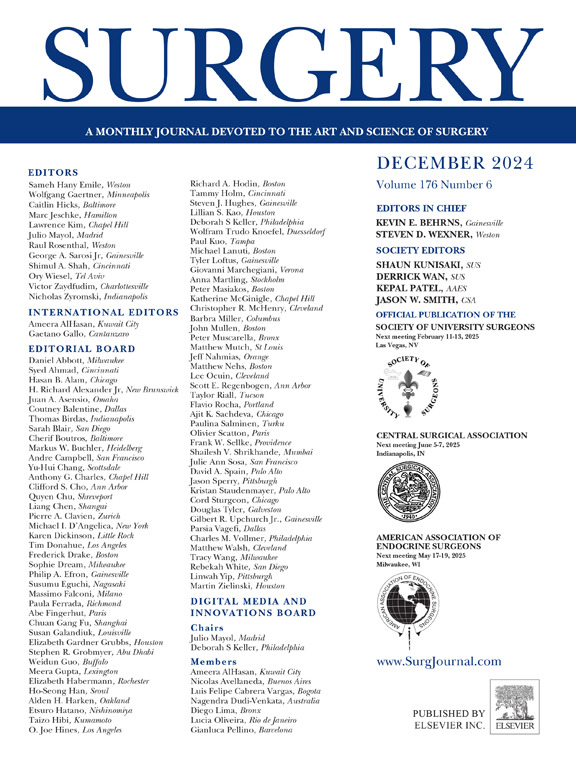IF 3.2
2区 医学
Q1 SURGERY
引用次数: 0
摘要
背景虽然腹腔灌洗细胞学阳性已被确定为胃癌和胰腺癌的重要预后因素,但其在十二指肠癌中的意义仍不明确。方法本研究分析了 2002 年至 2020 年期间在我院接受十二指肠癌手术切除的 74 例连续腹腔灌洗细胞学阳性患者。(胰十二指肠切除术,n = 58;部分切除术,n = 11;保胰十二指肠全切除术,n = 5)。结果8例腹腔灌洗细胞学阳性患者中,1例原发肿瘤深度为pT3,7例为pT4。腹腔灌洗细胞学阳性患者的无复发生存率和总生存率明显低于腹腔灌洗细胞学阴性患者(5 年无复发生存率:0.0% vs 78.0%,P < .001;5 年总生存率:12.5% vs 82.4%,P < .001)。在对T3或T4肿瘤患者(n = 38)进行的亚组分析中,腹腔灌洗细胞学阳性肿瘤患者的无复发生存率和总生存率明显低于腹腔灌洗细胞学阴性肿瘤患者(5年无复发生存率:0.0% vs 51.8%,P = .001;5年总生存率:12.5% vs 60.9%,P = .005)。结论十二指肠癌患者腹腔灌洗细胞学阳性与晚期肿瘤进展有关,是一个重要的预后标志物。这一发现强调了腹腔灌洗细胞学的重要性,它是鉴别可能需要多学科治疗方法的患者的重要工具。本文章由计算机程序翻译,如有差异,请以英文原文为准。
Clinical significance of peritoneal lavage cytology in duodenal cancer
Background
Although positive peritoneal lavage cytology has been established as an important prognostic factor in gastric and pancreatic cancers, its significance in duodenal cancer remains unclear.
Methods
This study analyzed 74 consecutive patients with peritoneal lavage cytology who underwent surgical resection for duodenal cancer at our institution between 2002 and 2020. (pancreatoduodenectomy, n = 58; partial resection, n = 11; and pancreas-sparing total duodenectomy, n = 5). Clinicopathologic features and survival outcomes were analyzed, focusing on the peritoneal lavage cytology status.
Results
Among the 8 peritoneal lavage cytology -positive patients, the primary tumor depth was classified as pT3 in 1 case and pT4 in 7 cases. The recurrence-free survival and overall survival rates were markedly worse in peritoneal lavage cytology–positive patients than in peritoneal lavage cytology–negative patients (5-year recurrence-free survival: 0.0% vs 78.0%, P < .001; 5-year overall survival: 12.5% vs 82.4%, P < .001). In a subgroup analysis of patients with T3 or T4 tumors (n = 38), the recurrence-free survival and overall survival were significantly poorer in patients with peritoneal lavage cytology–positive tumors than in those with peritoneal lavage cytology-negative tumors (5-year recurrence-free survival, 0.0% vs 51.8%, P = .001; 5-year overall survival, 12.5% vs 60.9%, P = .005). A multivariate analysis identified a peritoneal lavage cytology–positive status as an independent prognostic factor for the overall survival (hazard ratio, 3.38; P = .023).
Conclusion
Peritoneal lavage cytology positivity in patients with duodenal cancer was associated with advanced tumor progression and was a significant prognostic marker. This finding underscores the importance of peritoneal lavage cytology as a valuable tool for identifying patients who may require multidisciplinary treatment approaches.
求助全文
通过发布文献求助,成功后即可免费获取论文全文。
去求助
来源期刊

Surgery
医学-外科
CiteScore
5.40
自引率
5.30%
发文量
687
审稿时长
64 days
期刊介绍:
For 66 years, Surgery has published practical, authoritative information about procedures, clinical advances, and major trends shaping general surgery. Each issue features original scientific contributions and clinical reports. Peer-reviewed articles cover topics in oncology, trauma, gastrointestinal, vascular, and transplantation surgery. The journal also publishes papers from the meetings of its sponsoring societies, the Society of University Surgeons, the Central Surgical Association, and the American Association of Endocrine Surgeons.
 求助内容:
求助内容: 应助结果提醒方式:
应助结果提醒方式:


